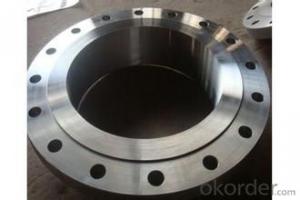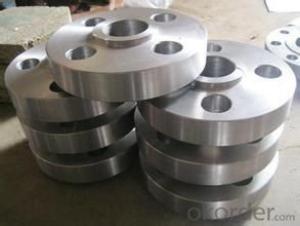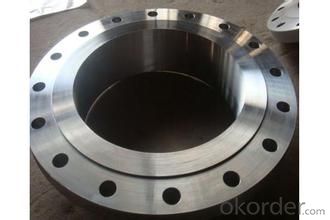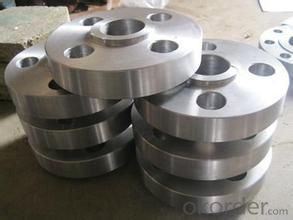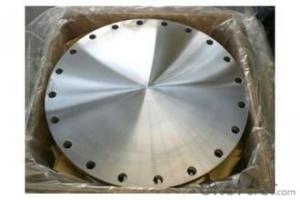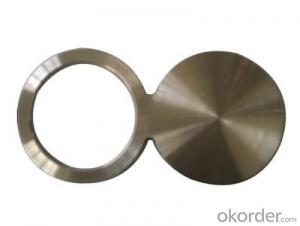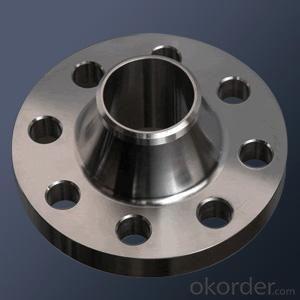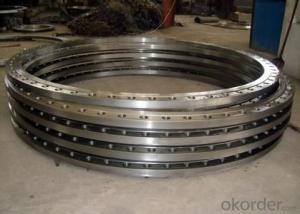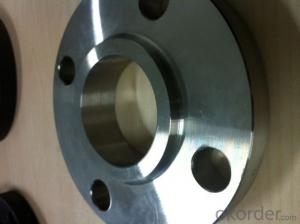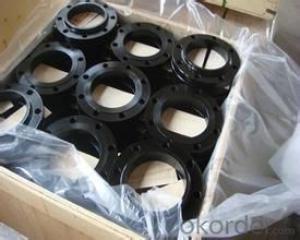STAINLESS STEEL PIPE FORGED SLIP ON FLANGES 304/316 ANSI B16.5 best price good quality
- Loading Port:
- Tianjin
- Payment Terms:
- TT OR LC
- Min Order Qty:
- 10 m.t.
- Supply Capability:
- 10000 m.t./month
OKorder Service Pledge
OKorder Financial Service
You Might Also Like
Package Of Stainless Steel Flange:
PACKED IN PLYWOOD CASES OR PALLETS
Painting Of Stainless Steel Flange:
ANTI-RUST OIL
Marking Of Stainless Steel Flange:
REFER TO MARKING DOCUMENT or AS PER CUSTOMER REQUEST
Shipping Marks Of Stainless Steel Flange:
EACH WOODEN BOX TWO PLASTIC SHIPPING MARKS
Specification Of Stainless Steel Flange:
Carbon Steel Flange Slip On Flange, Plate Flange, Blind Flange, Welding Neck Flange, Socket Welded Flange, Thread Flange, Lap Joint Flange, Long Welding Neck Flange
Size : 1/2"-48"
Wall Thickness.: SCH10-SCH160, SGP , XS, XXS, DIN ,STD
| Name | Stainless Steel Flange |
| Size | 1/2" - 48" |
| Face | RF, FF, RTJ |
| Wall thickness | Sch5-Sch160 XXS,STD,XS, SGP |
| Standard | ASME B16.5, B16.47, BS4504, JIS B2220, API 6A, 11Detc. |
| We can also produce according to drawing and standards provided by customers. | |
| Material | 304, 304L, 316, 316L, 304/304L, 316/316L, EN1.4301, EN1.4404 etc. |
| Packaging | Wooden Cases, wooden pallet , or carton box , or nylog bag and then in wooden cases |
| Surface Treatment | Anti-rust Oil |
| Delivery Time | 20-30 days, after received advance payment. |
| Quality | 100% Heat Treatment, No Welding repair |
| Others | 1.Special design available according to your drawing. |
| 2.anti-corrosion and high-temperature resistant with black painting | |
| 3. All the production process are made under the ISO9001:2000 strictly. | |
| 4. A conformity rate of ex-factory inspection of products. | |
| 5. we have export right , offering FOB , CNF CIF price |
STANDARD & MATERIAL GRADE
STAMDARD Of Carbon Steel Flange
| Standard | Pressure | Size | |
| European Standard | EN 1092-1 | Class PN6 ~ PN100 | DN10 ~ DN4000 |
| American Standard | ASME B16.5 | Class 150 ~ 2500 | 1/2" ~ 24" |
| ASME B16.47A | Class 150 ~ 900 | 26" ~ 60" | |
| ASME B16.47B | Class 75 ~ 900 | 26" ~ 60" | |
| German Standard | DIN 2527,2566,2573, 2576, 2627-2638,2641,2642,2655,2656 | PN6~PN100 | DN10 ~ DN4000 |
| Australian Standard | AS2129 | Table: T/A, T/D, T/E, T/F, T/H, T/J, T/K, T/R, T/S, T/T | DN15 ~ DN3000 |
| AS4087 | PN16 ~ PN35 | DN50 ~ DN1200 | |
| British Standard | BS4504 | PN2.5 ~ PN40 | DN10 ~ DN4000 |
| BS10 | T/A, T/D, T/E, T/F, T/H | 1/2" ~ 48" | |
| Japanese Standard | JIS B2220 | 5K ~ 30K | DN10 ~ DN1500 |
| API Standard | API 6A, 11D | 2000 PSI ~ 20000 PSI | 1 13/16" ~ 30" |
| French Standard | NFE 29203 | PN2.5 ~ PN420 | DN10 ~ DN600 |
MATERIAL Of Carbon Steel Flange
| Carbon Steel | ||
| Material Standard | Material Grade | |
| ASTM | ASTM A105 | A105, A105N |
| ASTM A350 | A350 LF1, LF2 | |
| ASTM A182 | F11, F12, F22 | |
| ASTM A106 | A, B, C | |
| DIN EN | DIN17175 | St35.8, St45.8, 15Mo3 |
| EN10216-2 | 195GH,P235GH, P265GH, 20MnNb6 | |
| JIS | JIS G3461 | STB340,410,510 |
| JIS G3462 | STBA12, 13, 20, 22, 23, 24 | |
| JIS G3454,G3455,G3456 | STPG 370, STB410, STS370,410, 510 | |
| STPT 370, 410, 480 | ||
- Q: Can steel pipes be used for underground fire sprinkler systems?
- Underground fire sprinkler systems can indeed utilize steel pipes. The reason for their frequent usage in fire sprinkler systems is because of their robustness, endurance, and ability to withstand heat and corrosion. They prove to be suitable for underground installations as they guarantee a dependable and long-lasting performance. Moreover, steel pipes come in a variety of sizes and configurations, allowing for flexibility in the design and installation of underground fire sprinkler systems. Nevertheless, it is crucial to ensure that the steel pipes are properly coated or protected to prevent corrosion and maintain their effectiveness in an underground setting. Regular inspections and maintenance are also imperative in order to identify any potential issues or damages to the steel pipes, thus preserving the safety and functionality of the fire sprinkler system.
- Q: How are steel pipes used in the automotive industry?
- Steel pipes are commonly used in the automotive industry for various applications such as exhaust systems, fuel lines, and structural components. They provide durability, strength, and resistance to high temperatures, making them ideal for carrying exhaust gases, fuel, and providing support to the vehicle's frame.
- Q: What are the different types of coatings used for external protection of steel pipes?
- There are several types of coatings used for external protection of steel pipes, including but not limited to: epoxy coatings, polyurethane coatings, fusion bonded epoxy (FBE) coatings, coal tar coatings, and zinc coatings. Each coating offers unique properties and benefits, such as corrosion resistance, abrasion resistance, and UV protection, to ensure the longevity and durability of the steel pipes in various environmental conditions.
- Q: Can steel pipes be used for underground compressed air pipelines?
- Indeed, underground compressed air pipelines can utilize steel pipes. The strength and durability of steel pipes make them a popular choice for subterranean pipelines. They possess the capacity to endure high pressure and withstand corrosion and other environmental elements. Moreover, steel pipes are renowned for their extended lifespan, rendering them a dependable option for compressed air pipelines. Nevertheless, it is crucial to guarantee the adequate coating and protection of the steel pipes to avert any potential corrosion concerns. Furthermore, the proper installation and maintenance of these pipelines are vital to ensure their efficiency and safety.
- Q: How do steel pipes perform in earthquake-prone regions?
- Steel pipes perform well in earthquake-prone regions due to their high strength and ductility. They are capable of flexing and absorbing seismic energy, reducing the risk of catastrophic failure. Additionally, steel pipes can be designed with proper reinforcement to withstand ground movements, making them a reliable choice for infrastructure in earthquake-prone areas.
- Q: Can steel pipes be used for petrochemical plants?
- Yes, steel pipes can be used for petrochemical plants. Steel pipes are often preferred in petrochemical plants due to their high strength, durability, and resistance to corrosion, making them ideal for handling various chemicals and substances involved in petrochemical processes. Additionally, steel pipes can withstand high pressure and temperature conditions commonly encountered in petrochemical plants, making them a reliable choice for transporting fluids and gases.
- Q: 20# seamless steel pipe and seamless steel pipe 20G what is the difference?
- 20G seamless steel tube is a high-pressure boiler tube. In addition to carbon content, 20G seamless steel tubes also have some trace elements that are more suitable for use as boiler pressure vessels. In addition, 20G also focuses on its physical performance. Such as bending, impact and tensile properties. 0G seamless steel tube is a kind of steel strip with hollow section and without seams. A steel pipe having a hollow cross section, used as a conduit for conveying fluids, such as pipelines for transporting petroleum, natural gas, gas, water, and certain solid materials.
- Q: What are the disadvantages of using steel pipes?
- One disadvantage of using steel pipes is that they are prone to corrosion, especially in environments with high humidity or exposure to certain chemicals. This can lead to structural damage and reduced lifespan of the pipes. Additionally, steel pipes are relatively heavy and bulky, making transportation and installation more challenging compared to other pipe materials. Lastly, steel pipes can be more expensive than alternative materials, which can impact project budgets.
- Q: Can steel pipes be used for gas transmission pipelines?
- Yes, steel pipes can be used for gas transmission pipelines. Steel is a commonly used material for gas pipelines due to its strength, durability, and resistance to corrosion. Additionally, steel pipes can withstand high pressure and temperature conditions, making them suitable for transporting natural gas over long distances.
- Q: How are steel pipes used in the manufacturing of irrigation systems?
- Steel pipes are commonly used in the manufacturing of irrigation systems due to their durability, strength, and resistance to corrosion. These pipes are used to transport water from a water source to the fields or crops, ensuring a reliable and efficient irrigation process. The steel pipes also provide stability and support to the system, allowing for the proper distribution of water to the desired areas.
Send your message to us
STAINLESS STEEL PIPE FORGED SLIP ON FLANGES 304/316 ANSI B16.5 best price good quality
- Loading Port:
- Tianjin
- Payment Terms:
- TT OR LC
- Min Order Qty:
- 10 m.t.
- Supply Capability:
- 10000 m.t./month
OKorder Service Pledge
OKorder Financial Service
Similar products
Hot products
Hot Searches
Related keywords
